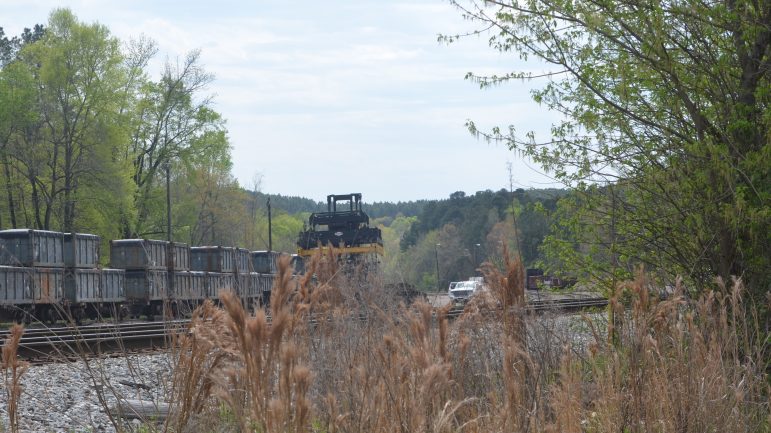Temperatures are warming up. And while many of us welcome spring weather, residents in the Walker County town of Parrish are filled with dread. That’s because the warmer it gets, the smellier the air becomes. That stench is human waste that a private company let sit on train cars for months.
Parrish resident George Horton lives about a block away from the rail yard where dozens of containers sit filled with treated sewage. That waste came from New York and New Jersey – more than a thousand miles away from this town west of Birmingham.
Horton cut his grass when it was warm outside a few weeks ago. And the smell, he says, was awful.
“You needed something to breathe. You need a mask on. You know in the morning if it was real cold like, it was kinda alright, it kept it down,” he says. “But when it heated up, it was rough.”
Parrish Mayor Heather Hall says the smell is more than just a typical odor.
“It smells like dead bodies. It’s terrible. Absolutely terrible. It doesn’t smell like sewer,” she says. “It smells like there’s a dead animal laying around.”
This treated waste has been stuck in Parrish since January. It should have been sent to Big Sky Environmental, a private landfill about 25 miles away from Parrish. Before that, all that waste sat nearby in the town of West Jefferson. But the West Jefferson mayor and Jefferson County officials raised a stink. Storing the waste in West Jefferson, they said, violated county zoning laws.
Hall says Big Sky representatives came to a Parrish town meeting in February. They promised to have all the waste shipped out by March 21.
Company officials haven’t said why that’s been delayed. And they did not return several calls requesting comment.
Hall says her patience has run out.
“I’ve done all I can do to try to do it nicely,” she says. “So, we are possibly looking at other avenues.”
She’s complained to groups like the Environmental Protection Agency and the Alabama Department of Environmental Management.
“I mean it’s really frustrating. Every time you go to EPA or ADEM or the Alabama Department of Public Health, we keep hitting a brick wall,” she says.
Over the weekend, a state lawmaker who intervened told Hall the containers would be cleared out in two weeks.
Several days ago she noticed there were fewer containers in the rail yard; only about a third remain from the 200 that were there.
Larry Swanson, who specializes in waste management at Stonybrook University in New York, says it’s not uncommon for states to send their treated sewage to other parts of the country.
Federal law prohibits dumping sludge into the ocean. In some instances, Swanson says, “the volume of it is so great, there is no place for New York to get rid of it within the city.”
Treated sewage is used to help condition soil in some states and it also acts as a seal to cover landfills, Swanson says. Last month, New York decided to stop shipping its bio waste to Alabama, according to published reports — at least for now.
Hall says she doesn’t have a problem with the private landfill company. She just wants the sludge cars moved so residents can enjoy the outdoors without the odor.


